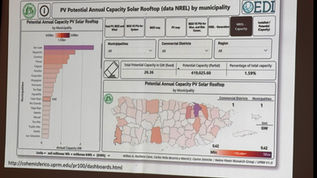
Energy Program
Puerto Rico.
Building a cleaner and fairer energy program in Puerto Rico
The Energy Situation in Puerto Rico
Puerto Rico’s energy system has faced big challenges for years. Most of our electricity still comes from imported fossil fuels—costly, polluting, and unreliable. Every time a storm hits or oil prices go up, our communities feel it. Blackouts, high bills, and fragile infrastructure are part of daily life for too many people.
At ISER Caribe, we believe Puerto Rico deserves better. We’re working toward a future where our energy is clean, affordable, and managed by the people who use it — our communities.
What Does “Energy Transition” Mean?
When we talk about an energy transition, we mean shifting from fossil fuels to renewable energy—like solar, wind, and micro-hydroelectric systems. But it’s more than just new technology; it’s about changing how power is produced, shared, and owned.
A real, just energy transition makes sure that no one gets left behind. It means giving communities the tools and knowledge to take control of their energy, save money, and build resilience against climate change. In short: it’s about energy for everyone, not just the few.
Our Summer Series on Renewable Energy
This past summer, ISER Caribe launched a Renewable Energy Talk Series to get people talking, learning, and connecting around Puerto Rico’s clean energy future.
Here’s what we covered:
1. Introduction to Renewables:
We kicked things off with an overview of how solar, wind, and other renewables work—and how they can reshape the island’s energy system. Our executive director provided an introductory presentation on the overall objectives of our summer energy conversation series and provided a general overview of our energy transition goals for southwest Puerto Rico. [ Presentation ]
2. Professional Panel:
Local experts shared insights about new job opportunities, microgrid research, and installation work in the growing renewable energy sector. The panel participants were => Sonia Villaverde Cuebas, at the time with Grid Alternative and now with ISER Caribe, José “West” Pagan of WEST Enterprise and Marcel Castro Sitiriche electrical engineering professor at University of Puerto Rico at Mayagüez.

3. Casa Pueblo’s Microgrid in Adjuntas:
We learned how the community in Adjuntas became a national model of energy independence through their solar-powered microgrid. Professor emeritus of electrical engineering electrical engineering at University of Puerto Rico at Mayagüez, Gerson Beauchamp, presented a masterclass on the history of Casa Pueblo and its community solar initiatives over the past 20 years.
4. Electric Cooperatives:
Braulio, our executive director closed out our summer energy conversations series gave a recap of the three previous presentations, and . We explored how energy co-ops can help communities share ownership, lower costs, and keep profits local.
These events sparked inspiring conversations about how we can all play a role in building a more sustainable and fair energy future.
What’s Next for ISER Caribe
We’re just getting started! Here’s what’s coming next:
-
Community Energy Assessments: We’re helping communities take the first step toward energy independence. Through our Community Energy Assessments, ISER Caribe works directly with residents, businesses, and local leaders to understand their unique energy needs and explore solar and microgrid options.
These assessments include evaluating rooftop solar potential, energy consumption patterns, and resilience strategies for emergencies. Our goal is to empower communities with clear, practical information so they can make informed decisions about their own renewable energy future
-
Pilot Microgrids: We’re moving from planning to action. ISER Caribe is partnering with municipalities, cooperatives, and community organizations to design and test small-scale renewable microgrids. These pilot projects will serve as living laboratories—demonstrating how clean, decentralized energy systems can power schools, community centers, or business districts during both normal conditions and emergencies. By focusing on community ownership and governance, these microgrids will keep the economic and social benefits of clean energy local.
-
Policy and Research: Good decisions require good data. Our research and policy team is producing applied studies and recommendations to promote energy justice, transparency, and sustainability in Puerto Rico’s energy transition.
We focus on understanding how renewable energy can reduce inequality, strengthen local economies, and build climate resilience. ISER Caribe also participates in public policy discussions, sharing science-based insights to ensure that Puerto Rico’s clean energy future is shaped by communities—not just corporations.
-
Youth and Workforce Programs: The energy transition needs people—skilled, motivated, and forward-thinking people. That’s why we’re developing training and mentorship programs for students, young professionals, and workers interested in renewable energy careers. Our goal is to prepare Puerto Rico’s next generation of solar installers, technicians, researchers, and policy advocates. Through workshops, internships, and hands-on learning opportunities, we’re building local capacity and keeping clean energy talent right here at home.
At ISER Caribe, we know that a sustainable energy future isn’t just possible—it’s already taking shape. And it starts with communities coming together to take control of their power.






